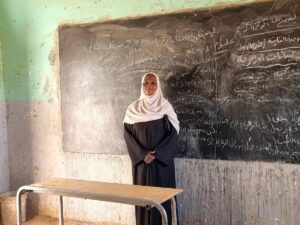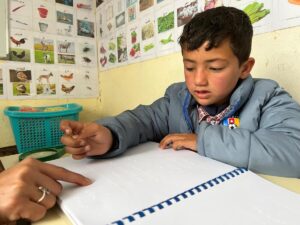Investing in Teachers: The bedrock of education systems
Save the Children’s new policy brief Unleash the Power: Why teachers hold the key to stronger education systems highlights some of the challenges teachers face in reaching every child with a safe, inclusive, and quality education and why teachers must be supported as the bedrock of education systems.
The Unique Role of Teachers
What I value most as a teacher is my ability to see children make individual progress in their personal lives; see children complete their education and become responsible citizens.
Teacher, Mbopuma Community school, Sioma District, Zambia

Teachers play a unique role in children’s learning and well-being. They are responsible for creating safe and enabling learning environments so that children can reach their full potential and dream of hopeful futures. During the pandemic, roughly 85 million teachers globally demonstrated their resilience and professionalism. In response to Covid-19 school closures and disruptions, teachers rapidly adopted hybrid and remote teaching and learning approaches with little training to keep learning alive for millions of children.
Beyond their commitment to teaching and learning, teachers have important responsibilities to ensure the physical and emotional safety of all children, particularly those who may be at risk. This includes girls, children with disabilities, refugees and children living in conflict and crisis. Evidence indicates that girls’ education in areas experiencing crisis can be improved with an increase in the presence of qualified and trained female teachers.[i]

Despite the vital role of teachers, the well- being and needs of teachers are oftentimes overlooked by national education systems and international organizations and donors. Save the Children’s new policy brief on teachers noted increases in the level of stress teachers experienced as a result of the pandemic and disruptions to their normal work routines. Yet, a UNESCO survey found that less than one-third of countries offered psychosocial support to teachers during the pandemic.
The failure of low and lower middle income countries to allocate sufficient and equitable financing to education has resulted in teacher shortages and overcrowding in classrooms, resulting in poor conditions for teaching and learning.
The personal risks and professional challenges for teachers working in conflict and crisis settings are even greater. In conflict settings, teachers often put themselves at risk delivering lessons from unsafe buildings or areas. As well, teachers themselves are at high risk of attack.[ii]
Teachers and effective teaching have a significant influence on student achievement. Importantly, a report by the Education Commission, indicates that several years of outstanding teaching may also offset learning deficits of disadvantaged students.[iii]
We know too that there are no better advocates for teaching and learning and for the profession than teachers themselves. As schools reopen and education systems attempt to recover from the impacts of the pandemic, teachers are taking the lead to provide students with social and emotional support and to catch up on learning.

As well, teachers have engaged in peer support prior to Covid-19 disruptions and continue to do so. Since 2019, Save the Children is engaging with teachers through the Transforming Refugee Education towards Excellence’ (TREE) programme in Jordan. This project is a joint initiative with several key implementing partners, including the Jordanian Ministry of Education. TREE engages teachers and other education professionals to co-design a new teacher professional development curriculum. The focus is on improving teacher occupational well-being and learning for students, including students who are refugees.
Recommendations
The new teachers policy brief recommends that national governments and global education donors, including Canada, should:
- Invest in evidence-based education system strengthening. This requires Investments in more research on the type of interventions that successfully support the teacher workforce, particularly in crisis settings.
- Support teachers to be the best professionals they can be. To do so, sufficient, equitable and sustainable education financing for teacher recruitment, professional development, and retention is needed.
- Engage teachers in policy making. Teachers should be supported to advocate for education within their communities and to work with governments to advance evidence-based sustainable solutions to build resilient education systems that improve children’s learning and well-being.
Unleashing the power of the world’s teachers will be essential to guarantee a quality, safe and inclusive education for all.
By: Samiera Zafar, Policy and Advocacy Advisor, Save the Children Canada
Sources:
[i] Plan International (2021) Education in Crisis
[ii] The Education Commission (2019) Transforming-the-Education-Workforce-Full-Report
[iii] The Education Commission (2019) Transforming-the-Education-Workforce-Full-Report


